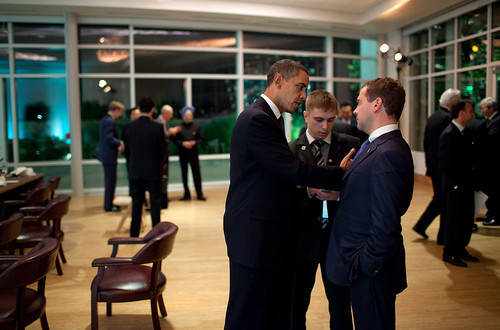[Guest post by DRJ]
Flanked by Secretary of State Hillary Clinton, Barack Obama announced today a new START treaty with Russia — replacing the one that expired in early December:
“Obama said nuclear weapons “represent both the darkest days of the Cold War, and the most troubling threats of our time.” He hailed the treaty as the start of a new effort to rid the world of that threat.”
Clinton said the treaty, which must be ratified by the U.S. Senate and the Russian Dura, adheres to Reagan’s promise to “Trust, but verify.” But there isn’t much in the reports about what those verification provisions entail.
Jake Tapper says this announcement could be considered Obama’s moment of relief rather than his accomplishment, since negotiations nearly fell apart due to American miscalculations:
“Negotiations were always tough.
“What we in retrospect learned and therefore maybe underestimated was that Russians hated the old START treaty,” a senior [Obama] administration official said.
Current Russian leaders hated the verification mechanisms in particular but also, having signed the treaty in July 1991 just months before the collapse of the USSR, they ”believe they signed that treaty at a time of weakness.” Thus in negotiations they tried to reduce the number of inspections, and the quality of inspections
Any inclusion of a missile defense system within the treaty would have also severely complicated, if not ruined, plans for US Senate ratification of the treaty, which requires a 2/3rds vote.
Part of the problem, one official said, was that President Obama felt his staff “had kind of bungled” announcements about key changes to the planned missile defense system.
In January, two planeloads of US officials – including National Security Adviser Gen. Jim Jones (ret.) and Chairman of the Joint Chiefs of Staff Admiral Mike Mullen – had flown to Moscow to meet with General Makarov and others “to seal the deal,” the US official said, “and missile defense didn’t come up once.”
It was a day-long meeting – a “tough long slog on negotiations, a lot of in the weeds stuff” on the number and intensity of inspections to come – and the issue was never raised. “We thought we were done,” the official said.
But the President had announced plans to change plans for a Europe-based missile defense system in September, and suddenly last month Romanian President Traian Basescu announced that his country would allow ground-based missile interceptors as part of the new plans for a US missile defense system.
The Russians “heard about what we were doing in Romania and they decide to take another hard run at trying to put missile defense in this treaty. They kept pushing and pushing, in Geneva and various places.”

Obama and Medvedev “during a brief pull-aside following the G-20 Summit Leaders working dinner at the Phipps Conservatory and Botanical Gardens in Pittsburgh, Pa., Sept. 24, 2009.” (Official White House Photo by Pete Souza)
The Obama Administration says the Russians dropped their missile defense demands, reportedly after Obama talked directly to Russian President Dmitry Medvedev and threatened to walk away from talks. An official described it as Obama facing down the Russian bear:
“At the end of the day it was a pivotal moment,” the official said, suggesting that the Russians saw President Obama as someone who wasn’t going to “cave.”
American reports maintain this shows Obama de-linked the START treaty and missile defense, but international reports cast doubt on that claim:
“Within minutes of President Obama making an announcement at the White House, Moscow claimed that for the first time the new treaty would establish a legally binding link between strategic weapons and missile defence systems, hinting that it might impose restrictions on America’s anti-missile programme, which the Russians oppose.
However, Robert Gates, the US Secretary for Defence, who attended the White House announcement ceremony, alongside Hilary Clinton, the Secretary of State, and Admiral Mike Mullen, Chairman of the Joint Chiefs of Staff, said that there would be no limits on missile defence. He said that the treaty would not prevent the US from “improving and deploying” missile defence systems in Europe and elsewhere.”
So much for getting the Russians to back down.
— DRJ



